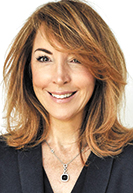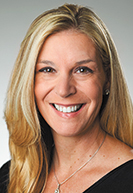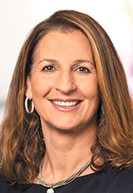Subscriber Benefit
As a subscriber you can listen to articles at work, in the car, or while you work out. Subscribe NowThey are no longer accepting the status quo.
Women general counsel at three of Indiana’s life sciences giants are helping their companies pivot to meet the new challenges of the global pandemic and positioning their legal departments to be an integral part of addressing social inequities. They also are not interested in doing things simply because that is how things have always been done.


Cynthia Kretz, vice president and general counsel of Bloomington-based Cook Group Inc., explained that “thinking outside the box” sometimes does not go far enough.
“You have to break the box, you have to just shatter the box and start new,” she said. “You have to start from scratch in your thinking.”
Undoubtedly 2020 has presented plenty of break-the-box opportunities for Kretz, Anat Hakim, senior vice president, general counsel and secretary of Eli Lilly and Co., and Marcela Kirberger, general counsel and corporate secretary for Roche Diagnostics Corporation in North America. They are leaders in companies with operations around the world and with missions that reflect a strong social consciousness.
Their backgrounds and paths to in-house law are different.

Kretz grew up in Cedar Lake, Indiana, the daughter of a police officer. Hakim immigrated to the United States from Israel as a 7-year-old, becoming an outsider because, she said, she had a “funny name,” did not speak English and her family would spend their weekends picking through garbage cans looking for discarded treasures. Kirberger was 23 with a law degree from Catholic University in Argentina when she immigrated to America.
As leaders, they welcome diverse voices and they focus on empowering their in-house colleagues. Most importantly, they are comfortable with change.
“I question things that don’t make sense to me,” Kirberger said. “I question the status quo always. I am a big believer in thinking from a perspective of what’s possible.”
Making changes
After 17 years as a litigator for Latham Watkins then Foley & Lardner LLP, Hakim was thinking about leaving the profession. The Harvard Law School graduate was no longer passing her personal career happiness test of being excited on Sunday nights about the work week ahead.
Hakim was considering possibly starting a business, running for office or entering academia when she foundAbbott Laboratories’ job listing on the internet for a global head of patent litigation. She joined Abbott then moved to WellCare Health Plans, Inc. before she arrived at Lilly in 2020.
The fast pace and juggling input from different components of the company such as finance, public affairs and research and development appealed to her. To build a legal department that keeps pace with the business, she looks for attorneys who are not afraid to be different, have nimble minds and are comfortable with gray areas.
Being a lawyer who recites the law then advises the same course of action as what was done in the past is easy, Hakim said. The better lawyers take the more difficult approach of doing analysis, applying their legal judgment and experience then making a recommendation.
“It’s being thoughtful every single time because the facts are always different. Everything is changing constantly,” she said. “So everyday you’re resynthesizing what your advice is going to be on a particular issue because you have to take all of that into account.”
Among the changes this year have been the recognition of systemic racism and the renewal of commitments to bettering society. Lilly, Cook and Roche have always embraced diversity and inclusion and been strong community partners, but with the pandemic, they have placed more emphasis on social responsibility.
Hakim sees the legal department as part of the company’s effort to be socially responsible. The in-house team has contact with so many facets of the company that the lawyers can be a reminder of the company’s mission by reflecting that attitude of social responsibility, diversity, and inclusion in everything they do.
“I think legal plays an important role because we touch so many parts of the company, but it doesn’t originate with legal,” she said. “We’re part of the effort, an important part, but just a part.”
As a life sciences company, civic duty is entwined in the daily business activities at Roche, Kirberger said. The focus on improving patients’ health goes beyond diagnostics and therapies to also include what is happening in society that is adversely impacting people’s lives.
“We cannot divorce what we do for patients from those very patients’ wellbing,” she said. “And social injustice affects the wellbeing of the same patients whose health we seek to improve. There’s a huge opportunity and we’re committed, even within our strategy, to advancing equality, striving for inclusiveness at the company and in our communities.”
Empowering others
Settled in the United States, Kirberger was content to work as an environmental law paralegal for a telecommunications company and, she said, she probably would have spent her career there if an attorney had not asked to quit showing the clients she knew the case better than he did.
She enrolled in night classes at Rutgers Law School where a few times her toddler children were in tow. After graduation and clerkship with the New Jersey Appellate Division, she joined Lowenstein Sandler as a securities litigator. Four years later, she moved in-house at Novartis for 11 years then served as global general counsel for Leica Microsystems before coming to Roche in 2019.
Despite being thrilled at being in America, Kirberger had a lot of insecurities and felt she had to prove herself over and over. Working hard and taking risks, she accomplished her own success but she retains a deep affinity for people who struggle. She remembers the difficult time she had finding her footing without having someone to help her gain confidence and connect with other people.
Kirberger now carves time out of her busy schedule to mentor a handful of men and women.
“At this stage in my career it’s one of the things that gives me the most pleasure to do,” she said. “I think I need to do it and I have an obligation as somebody who came from another country and had a successful career to help others in their journey.”
Kretz practices what she calls the “tenets of servant leadership.” One part of that is cultivating leadership in others by delegating work, letting them gain experience and not answering all the questions for them. The other part is listening.
“People will gain a willingness to talk to you if you’re open and empathetic and truly listen to them,” she said. “…I don’t think attorneys are in the room the talk.”
Hakim wants diversity and fosters inclusion by inviting people into the conversation. The best departments she said are those that have many different viewpoints and they tend to make the best decisions because they are able to draw from an array of ideas and experiences.
“I don’t like to run groups that are monolithic whether in thinking or in characteristics,” she said. “I think to be the best you have to be willing to have an environment where people feel psychologically safe to challenge each other.”
Staying grounded
Kretz relocated to Chicago having just completed her undergraduate degree at Indiana University-Bloomington and was looking toward a career in law. Her first stop was getting trained as a paralegal at Roosevelt University, then getting a job in the legal department at Bridgestone.
From there, Kretz enrolled in evening classes and eventually graduated from University of Illinois at Chicago John Marshall Law School.
A brief turn practicing at an insurance defense firm in northwest Indiana was not as much fun as she expected, so Kretz moved to Lafayette to become the only in-house lawyer for Wabash National. She grew the department into a resource for more than just employment matters and achieved the position of vice president, general counsel and corporate secretary to the board of directors.
After nearly nine years at Wabash, she returned to Bloomington in 2008 to join Cook.
Kretz goes home each night to twin daughters who are now 16. She said they have taught her to listen without correcting them or making a quick judgment. Also, they will call her bluff, something she suspects her colleagues at work may hesitate to do because she is a company executive.
“I think my children, they teach me on a daily basis,” Kretz said. “They give me insights that I would have never thought of on a variety to different things.”
Both Hakim and Kirberger also draw strength from their families which may become more important for all three women as the world tries to tame the COVID-19 pandemic. Their legal departments have had to quickly adjust and meet the changing demands as their companies have responded to the public health emergency.
Hakim sees the global crisis as teaching in-house lawyers they can move faster and do a good job. Moreover, the attorneys and staff in her legal department have become closer, having honest conversations and being a little more vulnerable with one another. In meetings, the attorneys and staff have talked about the challenge of working remotely and caring for children and of family members who are sick or have died.
“As a group you go through these things now which are so deep, they are so humanizing,” Hakim said. “I think that has changed how we related to each other.”
Kirberger is hoping the world does not return to the pre-pandemic normal. She believes the coronavirus as making a permanent change and is creating the opportunity for things to be much better than before. The evolution to building better legal departments and better community begins, she said, by questioning the status quo.
“I’m always an optimist,” Kirberger said. “I think every little bit helps. I strongly believe in grassroots movements and the power of numbers. If everybody does their part, we can make a significant impact.”•
Please enable JavaScript to view this content.

